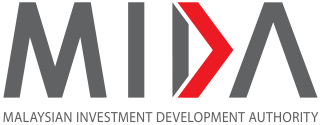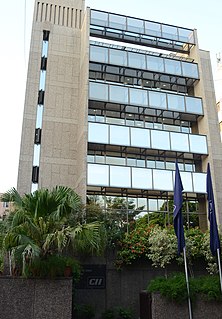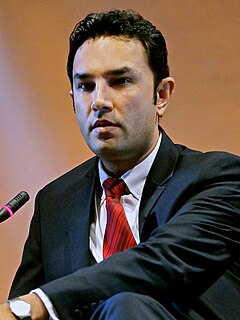
The Asian Development Bank (ADB) is a regional development bank established on 19 December 1966, which is headquartered in the Ortigas Center located in the city of Mandaluyong, Metro Manila, Philippines. The company also maintains 31 field offices around the world to promote social and economic development in Asia. The bank admits the members of the United Nations Economic and Social Commission for Asia and the Pacific and non-regional developed countries. From 31 members at its establishment, ADB now has 68 members.

Kuala Lumpur, officially the Federal Territory of Kuala Lumpur and colloquially referred to as KL, is a federal territory and the capital city of Malaysia. It is the largest city in Malaysia, covering an area of 243 km2 (94 sq mi) with an estimated population of 1.73 million as of 2016. Greater Kuala Lumpur, also known as the Klang Valley, is an urban agglomeration of 7.564 million people as of 2018. It is among the fastest growing metropolitan regions in Southeast Asia, in both population and economic development.

Klang Valley is an urban conglomeration in Malaysia that is centered in Kuala Lumpur, and includes its adjoining cities and towns in the state of Selangor. It is conterminous with Greater Kuala Lumpur, although there are variations between the two.
YTL Corporation Berhad is a Malaysian infrastructure conglomerate, founded in 1955 by Yeoh Tiong Lay, after whom the group is named. The company has grown from a small construction firm into a global infrastructure company generating over RM18 billion in revenues with over 70 percent coming from overseas.

Sister Cities International (SCI) is a nonprofit citizen diplomacy network that creates and strengthens partnerships between communities in the United States and those in other countries, particularly through the establishment of "sister cities". A total of 1,800 cities, states, and counties are partnered in 138 countries around the world. The organization "strives to build global cooperation at the municipal level, promote cultural understanding and stimulate economic development".

The Malaysian Investment Development Authority, abbreviated MIDA, previously known as Malaysian Industrial Development Authority is the government's principal agency to oversee and drive investment into the manufacturing and services sectors in Malaysia. Starting operations in 1967, MIDA was given the mandate to promote investments in the manufacturing and services sectors; and to advise the Ministry of International Trade and Industry (MITI) on industry matters including the formulation of related policies.

The Kuala Lumpur Convention Centre is a convention and exhibition centre located in the Kuala Lumpur City Centre (KLCC) development in Kuala Lumpur, Malaysia.

The Confederation of Indian Industry (CII) is a non-governmental trade association and advocacy group based in New Delhi, India founded in 1895.
Founded in 1994, Alternatives, Action and Communication Network for International Development, is a non-governmental, international solidarity organization based in Montreal, Quebec, Canada.
The Pacific Economic Cooperation Council (PECC) is a network of member committees composed of individuals and institutions dedicated to promoting cooperation across the Asia Pacific region, headquartered in Singapore. PECC has 23 full member committees Australia; Brunei Darussalam; Canada; Chile; China; Colombia; Ecuador; Hong Kong; Indonesia; Japan; Korea; Malaysia; Mexico; Mongolia; New Zealand; Peru; the Philippines; Singapore; Taiwan; Thailand; the United States; Vietnam and the Pacific Island Forum, one associate member: France, and 2 institutional members: Pacific Trade and Development Conference (PAFTAD) and the Pacific Basin Economic Council (PBEC).

The C40 Cities Climate Leadership Group is a group of 97 cities around the world that represents one twelfth of the world's population and one quarter of the global economy. Created and led by cities, C40 is focused on fighting climate change and driving urban action that reduces greenhouse gas emissions and climate risks, while increasing the health, wellbeing and economic opportunities of urban citizens.
Dr. Khairuddin bin Mohamed Yusof is a Professor Emeritus at the University of Malaya. He receives the Emeritus from the university in year 2004 and Darjah Dato` Paduka Cura Simanja Kini (DPCM) which brings the title of "Dato’ Paduka" from Malaysia's state King of Perak in 1998.

The Mekong–Ganga Cooperation (MGC) was established on November 10, 2000, at Vientiane, Laos at the First MGC Ministerial Meeting. It comprises six member countries, namely India, Thailand, Myanmar, Cambodia, Laos and Vietnam. The four areas of cooperation are tourism, culture, education, and transportation. The organization takes its name from the Ganga and the Mekong, two large rivers in the region.

The Union for the Mediterranean is an intergovernmental organization of 42 member states from Europe and the Mediterranean Basin: the 27 EU member states and 15 Mediterranean partner countries from North Africa, Western Asia and Southern Europe. It was founded on 13 July 2008 at the Paris Summit for the Mediterranean, with an aim of reinforcing the Euro-Mediterranean Partnership (Euromed) that was set up in 1995 as the Barcelona Process. Its general secretariat is located in Barcelona, Spain.

Created by the Assembly of European Regions (AER), the Youth Regional Network (YRN) is a platform of regional-level youth organisations, councils and parliaments from across wider Europe. The platform works as a forum where young people can influence regional and European policy while exchanging experiences and good practice. At the general Assembly in Vojvodina on 7 May 2017, YRN members elected their presidium, which is composed as follow:
Water supply and sanitation in Malaysia is characterised by numerous achievements, as well as some challenges. Universal access to water supply at affordable tariffs is a substantial achievement. The government has also shown a commitment to make the sector more efficient, to create a sustainable funding mechanism and to improve the customer orientation of service providers through sector reforms enacted in 2006. The reform creates a modern institutional structure for the water sector, including an autonomous regulatory agency, an asset management company and commercialised state water companies that have to reach certain key performance indicators that will be monitored by the regulatory agency. The government has also stated its intention not to embark on new private sector contracts for water provision, after a bout of such contracts during the 1990s showed mixed results.
Women Deliver is a global advocacy organization that works to generate political commitment and financial investment for fulfilling Millennium Development Goal 5—reducing maternal mortality and achieving universal access to reproductive health.

The Asia-Pacific Advanced Network (APAN) is a not-for-profit association of Asia-Pacific national research and education networks (NRENs) incorporated in Hong Kong as a company limited by guarantee. The organisation was originally formed on 3 June 1997 and was incorporated on 8 August 2009.

Wahidullah Waissi is a career Afghan diplomat. He is now serving as an Ambassador of Islamic Republic of Afghanistan to the Commonwealth of Australia, New Zealand and Republic of Fiji. He worked as Director-General for Economic Cooperation at the Ministry of Foreign Affairs of Islamic Republic of Afghanistan from 2012 to 2016 overseeing regional economic cooperation and multilateral development partnerships, chaired economic diplomacy committee, coordinated Regional Economic Cooperation Conference for Afghanistan process and projects and served as a Focal Point for economic Confidence Building Measures (CBMs) of the Heart of Asia Istanbul Process.
The ASEAN Smart Cities Network (ASCN) is a collaborative platform which aims to unify smart city development efforts across ASEAN by facilitating cooperation on smart city development, creating bankable projects in conjunction with the private sector, and securing funding and support from ASEAN's external partners. It was launched at the 32nd ASEAN Summit as a key deliverable of Singapore's ASEAN Chairmanship 2018. The Inaugural Meeting of the ASCN took place on 8 July 2018.












